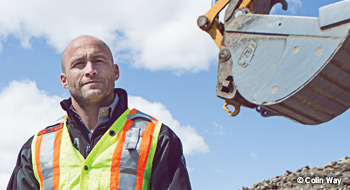
Bill Borger, owner and president of the Calgary-based Borger Group of Companies, is adamant that safety is important. It’s something that he believes should be a priority whether you’re climbing Mount Everest—which he did in 2011—or running a construction business.
But in the construction industry, creating a culture of safety is an uphill climb. “There are guys walking on frozen pipe, [walking] under overhead cranes, going up and down icy ditches,” says Borger. “It’s a very, very dangerous business.”
To combat the dangers, the family-owned construction company has developed a culture of safety—and, last year, took home Canada’s Safest Employers Silver Award.
“Back in the old days, safety was a demand thing,” says Debby Carreau, CEO and founder of Inspired HR, which provides Borger’s HR activities. “It was, ‘Put on your helmet and follow the safety checklist.’ We really wanted to change it to a culture where people wanted to put on their hard hats.”
Borger couldn’t agree more. He says safety has always been a big focus in the company, adding that, over the last six years, the construction industry has had a rising number of fatalities in Alberta.
“We want nothing to do with anybody getting hurt; we want everyone going home safe,” he explains. “I put safety as one of the leading indicators of corporate culture. If safety records start to fall, it’s probably an indication that everything’s falling.”
Harnessing Company Potential
Borger does have a good safety record—in fact, last year, the company received at least two projects because of its safety program and exceptional safety record. Borger credits its safety record to the hard work, commitment, and creativity of its safety team.
As well, to prevent the safety records of the 300-plus-employee company from declining, Borger implemented a number of initiatives.
Last year, the company established a target of 1,500 days with no time-loss accidents (work-related injuries that hinder employees from performing their duties the day after the accident) within each of Borger’s three companies: underground construction, earth moving and transportation.
When that target was reached in October 2013, each employee received two tickets to the Calgary Stampeders’ Western Final for the CFL, complete with a tailgate party including face painters, jugglers and loot bags full of Borger swag labelled with 1,500 days. This year, the company is targeting 2,500 days with no time-loss accidents.
The company also has its own weekly safety, production and cost savings (SPC) award, which recognizes the safest employee who is also contributing to the company’s production and cost savings. Borger announces the winner of the award each Monday, along with a safety tip of the week, in a phone call that is broadcast to everyone in the company. The winners also receive Borger Bucks—a currency unique to Borger that is used to purchase items ranging from gift cards, hats and hoodies to larger-ticket items, such as hockey tickets and travel vouchers, from the Borger online store.
Even employee compensation is tied to safety. “Every single person’s bonus in the company is performance-based—of which, next to production, safety is the largest component. So you could lose your entire bonus by having a bad safety record,” Borger explains, adding that employees have access to how their bonuses are calculated and what score they need to get the top-end bonus for their position.
R-E-S-P-E-C-T
Another issue that goes hand in hand with safety is respect. Carreau says the December 2012 employee survey indicated that some workers didn’t always feel respected at work. “It wasn’t so much the head office and the senior people,” she notes. “It was really the crews in the workplace…when the foreman is trying to get jobs done or when people are pressured for timelines. How do they focus on the right things and quality while getting things done in a respectful manner?”
To help retain employees and keep the culture positive, Borger implemented the Respect in the Workplace program in April 2013. In fact, it’s the first construction company in Canada to bring in the program. Every employee in the company has to take a three-hour online course every three years.
“They don’t get their bonus for the prior year until they’ve taken the training—including myself,” says Borger. “We believe that respect starts before safety as part of the foundation of attitudes in corporations.”
Reaching the Top
Whether he’s focused on construction or climbing, Borger approaches both his personal life and his business life with a sense of teamwork and adventure.
“The whole thing ends up being about teamwork, at the end of the day,” he explains. “Individual efforts are great, but it’s the combined effort that makes the climbs possible, makes our business possible.”
Borger admits that the company is putting in more money into the safety program than it’s directly getting out of it. “Indirectly, I believe that it’s very profitable to do that,” he explains. “I never want anybody getting hurt in our company. It’s not all about dollars and cents.”
And he believes that the company expenditures on safety—the awards, the tailgate party and Stampeders’ tickets—are all worth it. “We’re not afraid to throw a $60,000 party if you meet your targets in a single year,” he says. “I’m not saving the money in WCB [Workers’ Compensation Board]. But what I am doing is making this the most attractive and best place to be.”
For his part, Borger is getting ready for climbing season soon, heading out to Squamish, B.C., to get in form. He has a few climbing objectives planned for this year, but he doesn’t exactly know where yet. “There will just be some obscure wall somewhere that’s going to catch my attention.”
Whatever the peak, though, you can bet he’ll put safety first.
Brooke Smith is managing editor of Benefits Canada.
Get a PDF of this article.
